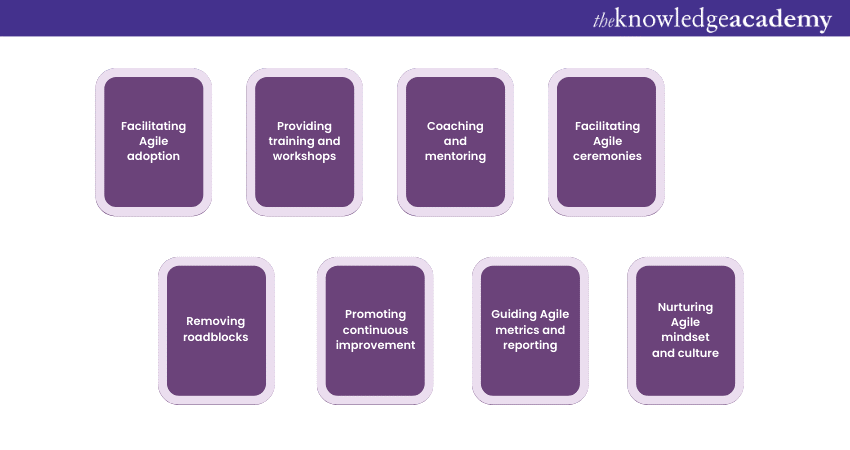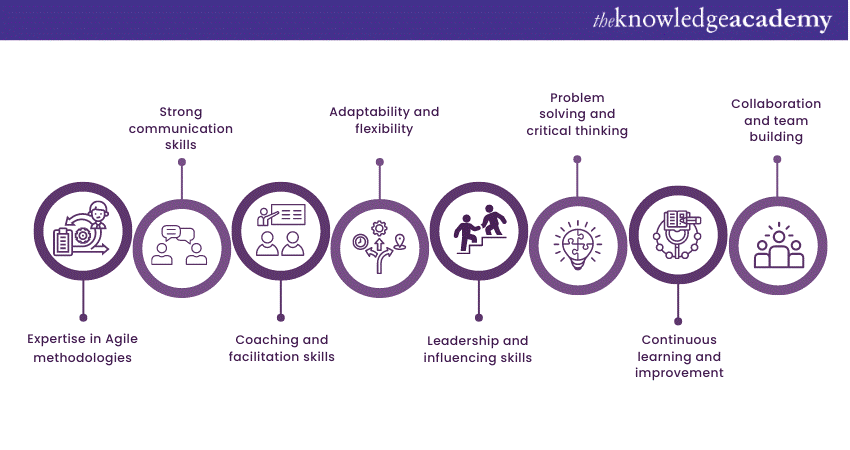We may not have the course you’re looking for. If you enquire or give us a call on +91 8037244591 and speak to our training experts, we may still be able to help with your training requirements.
Training Outcomes Within Your Budget!
We ensure quality, budget-alignment, and timely delivery by our expert instructors.

Organisations in the modern digital era aim to have optimum efficiency in their Project Management processes. To achieve this, they often adopt Agile Methodology, a dynamic and iterative approach to Project Management that promotes flexibility, collaboration and adaptability. Organisations need Agile Coaches to review the adoption process to ensure successful implementation, and therefore many people often ask, “What is an Agile Coach?”
According to Glassdoor, an Agile Coach in the United Kingdom earns an average annual salary of £81,125. The demand for the role as well as the lucrative packages, have prompted aspiring professionals to enquire about the roles and responsibilities of an Agile Coach. This blog will answer the question - What is an Agile Coach, what are their responsibilities, and the skills and qualities required to be in the position, respectively.
Table of Contents
1) Definition of an Agile Coach
2) Responsibilities of an Agile Coach
a) Facilitating Agile adoption
b) Providing training and workshops
c) Coaching and mentoring
d) Facilitating Agile ceremonies
e) Removing roadblocks
f) Promoting continuous improvement
g) Guiding Agile metrics and reporting
h) Nurturing Agile mindset and culture
3) Skills and qualities of an Agile Coach
4) Conclusion
Definition of an Agile Coach
An Agile Coach is a professional who guides organisations and teams in adopting and implementing Agile practices. They act as mentors, facilitators, and change agents, helping teams and individuals understand and embrace Agile principles and values. An Agile Coach supports the organisation in achieving its goals by promoting collaboration, continuous improvement, and adaptive planning.
Level up your Agile Change Management skills with our Agile Change Agent Course. Register now and become a catalyst for a successful transformation!
Responsibilities of an Agile Coach
As an Agile Coach, one shoulder a diverse range of responsibilities aimed at guiding teams and organisations towards successful implementation of Agile practices. Agile Coaches play a vital role in facilitating the transformation journey with a focus on fostering collaboration, continuous improvement, and adaptability. Here are some key responsibilities they undertake:

1) Facilitating Agile adoption: Agile Coaches lead organisations through the transition from traditional methodologies to Agile frameworks. They introduce Agile principles, practices, and frameworks such as Scrum or Kanban, ensuring teams understand their purpose and benefits. By guiding the adoption process, they minimise disruptions and help teams embrace new ways of working.
2) Providing training and workshops: Agile Coaches conduct training sessions and workshops to educate team members on Agile methodologies, techniques, and tools. They provide individuals with the knowledge and skills required to effectively apply Agile practices in their daily work. Through interactive sessions, they create an engaging learning environment that promotes understanding and encourages active participation.
3) Coaching and mentoring: Agile Coaches provide one-on-one coaching and mentoring to team members, Scrum Masters, Product Owners, and other stakeholders. They offer guidance and support, helping individuals enhance their understanding and application of Agile principles. By leveraging their expertise, coaches assist in overcoming challenges, navigating complexities, and promoting continuous growth and improvement.
4) Facilitating Agile ceremonies: Agile Coaches play a pivotal role in facilitating essential Agile ceremonies such as daily stand-ups, sprint planning, retrospectives, and sprint reviews. They ensure these ceremonies are conducted effectively, encouraging collaboration, communication, and transparency within the team. Coaches also help teams maximise the value they derive from these ceremonies by providing guidance on best practices and continuous improvement opportunities.
5) Removing roadblocks: Agile Coaches identify and address obstacles that hinder team progress. These roadblocks may range from process-related issues to interpersonal conflicts. By actively engaging with teams, Coaches help in problem-solving, encouraging teams to self-organise and find effective solutions. They serve an environment where impediments are swiftly addressed, enabling teams to deliver value more efficiently.
6) Promoting continuous improvement: Agile Coaches drive a culture of continuous improvement within teams and organisations. They encourage regular retrospectives, where teams reflect on their performance, identify areas for improvement, and implement actionable changes. By facilitating these sessions, Coaches ensure teams have the opportunity to adapt, learn, and enhance their working practices.
7) Guiding Agile metrics and reporting: Agile Coaches assist teams in establishing meaningful metrics and reporting mechanisms. They help define Key Performance Indicators (KPIs) that align with organisational goals and provide insights into team performance. By leveraging data-driven approaches, Coaches enable teams to make informed decisions, track progress, and continuously improve their delivery.
8) Nurturing Agile mindset and culture: Agile Coaches focus on nurturing an Agile mindset and fostering a culture of collaboration, adaptability, and continuous learning. They promote values such as transparency, trust, and respect within teams. Coaches encourage teams to embrace change, experiment, and iterate to deliver better outcomes. By modelling the Agile mindset, themselves, Coaches inspire others to adopt agility in their work.
Gain a comprehensive understanding of Agile methodologies with our Agile Overview Course. Register today and embark on your journey to become an Agile Coach!
Skills and qualities of an Agile Coach
Being an effective Agile Coach requires a unique set of skills and qualities that enable them to guide teams and organisations towards successful Agile adoption and implementation. Here are some of the key skills required:

1) Expertise in Agile methodologies: An Agile Coach should possess a deep understanding of Agile principles, methodologies, and frameworks such as Scrum, Kanban, or Lean. They should be well-versed in Agile practices and must be able to apply them in various contexts. This expertise allows them to guide teams effectively and make informed decisions.
2) Strong communication skills: Strong communication skill is crucial for an Agile Coach. They must be able to communicate clearly and concisely, adapting their communication style to different audiences and stakeholders. They should be skilled in active listening, facilitating discussions, and delivering feedback constructively. Strong communication skills foster collaboration, understanding, and engagement within teams.
3) Coaching and facilitation skills: Agile Coaches act as mentors and guides to teams and individuals. They should have strong coaching and facilitation skills to support teams in achieving their goals. This includes asking powerful questions, active listening, providing constructive feedback, and facilitating effective meetings and workshops. Coaches help teams discover their own solutions and encourage continuous improvement.
4) Adaptability and flexibility: Agile Coaches operate in dynamic environments where change is the norm. They should be adaptable and flexible, capable of adjusting their approach based on the needs of the team and organisation. They should embrace change themselves and help teams navigate through uncertainty and ambiguity effectively.
Ace your Agile interview with confidence! Dive into our curated list of top Agile Interview Questions today.
5) Leadership and influencing skills: Agile Coaches demonstrate leadership qualities by inspiring and motivating teams. They should be able to influence and guide individuals and stakeholders towards Agile practices and principles. By leading by example, coaches inspire trust and encourage others to embrace Agile values and mindsets.
6) Problem-solving and critical thinking: Agile Coaches should possess strong problem-solving and critical-thinking skills. They should be able to analyse complex situations, identify root causes of issues, and propose effective solutions. Coaches help teams overcome challenges, remove obstacles, and promote continuous improvement.
7) Continuous learning and improvement: Agile Coaches should have a passion for learning and stay updated with the latest trends and developments in the Agile field. They should continuously enhance their knowledge and skills through attending conferences, workshops, and networking with other Agile professionals. This enables them to bring fresh insights and approaches to their coaching practice.
8) Collaboration and team building: Agile Coaches foster a collaborative and inclusive environment within teams. They should be skilled in building strong relationships, promoting teamwork, and resolving conflicts. Coaches encourage cross-functional collaboration and help teams develop a sense of shared purpose and accountability.

Conclusion
All in all, an Agile Coach plays a crucial role in guiding organisations and teams towards the successful adoption and implementation of Agile practices. Their expertise, coaching techniques, and support help teams become more collaborative, adaptive, and focused on delivering value. By embracing the Agile mindset and leveraging the skills of an Agile Coach, organisations can navigate the complexities of the present day's business landscape with resilience. Hope this blog answers all your queries about What is an Agile Coach!
Unlock your potential in Agile Project Management. Sign up for our Agile Training Courses today!
Frequently Asked Questions
Upcoming Project Management Resources Batches & Dates
Date
 Agile Project Management Foundation & Practitioner (AgilePM®)
Agile Project Management Foundation & Practitioner (AgilePM®)
Thu 1st Jan 1970







 Top Rated Course
Top Rated Course


 If you wish to make any changes to your course, please
If you wish to make any changes to your course, please


